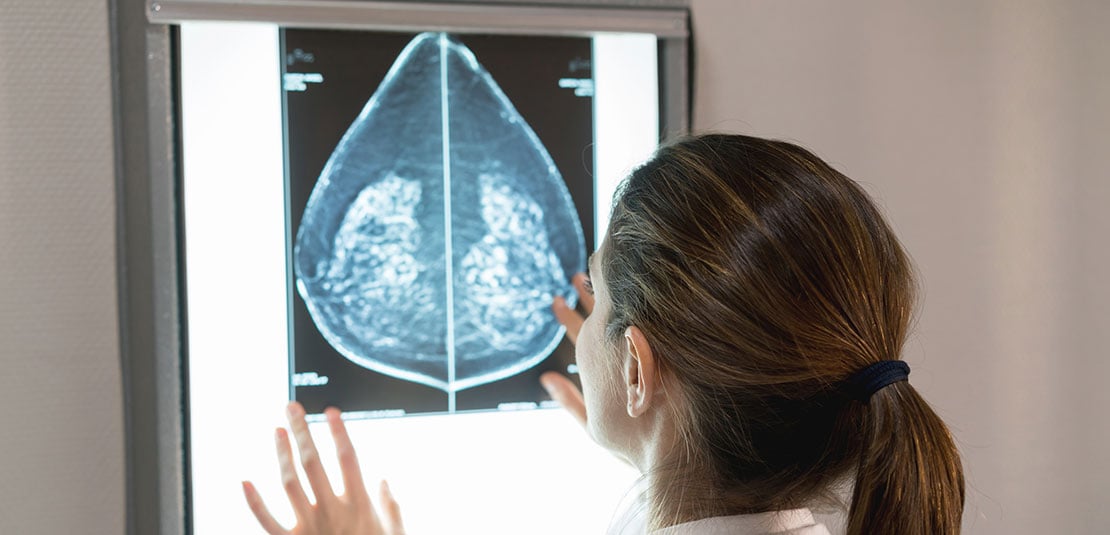Breast Magnetic Resonance Imaging (MRI)

A powerful diagnostic tool for evaluating breast health, breast magnetic resonance imaging (MRI) uses radio waves and a strong magnetic field to create detailed images of breast tissue, which can aid a physician in detecting and characterizing any abnormalities. MRI has the highest cancer detection rate of all breast imaging exams across all breast density categories.
Who should get a breast MRI?
A physician may recommend a breast MRI for a patient who is at heightened risk for developing breast cancer due to:
- A strong family history of breast cancer
- An inherited mutation in breast cancer gene 1 (BRCA1) or breast cancer gene 2 (BRCA2)
- A personal history of breast cancer
- A genetic syndrome, such as Lynch syndrome, Li–Fraumeni syndrome, Cowden syndrome or Peutz–Jeghers syndrome
- Dense breast tissue
Additionally, a physician may order a breast MRI to further evaluate an inconclusive mammogram or ultrasound image.
Why would a physician recommend a breast MRI?
Breast MRI produces clear images of breast tissue that can help a physician detect abnormalities that may not be visible in a mammogram or ultrasound, particularly if the breast tissue is dense. It can also provide valuable information about the size, characteristics and extent of a breast tumor.
In addition to following up on an inconclusive breast cancer screening test, a physician may recommend a breast MRI to:
- Screen a high-risk individual for breast cancer
- Investigate symptoms, such as a suspicious breast mass or unusual nipple discharge
- Stage a newly diagnosed tumor
- Monitor a patient’s response to chemotherapy administered before surgery to shrink the tumor
- Check for silicone breast implant leakage
What to expect during a breast MRI
Before a breast MRI, a contrast agent will be administered intravenously to enhance the visibility of the breast tissue in the resulting images. During the procedure, the patient will lie face down on a padded table with their breasts positioned in openings to the MRI machine. A radiology technologist will then create a series of detailed images of the breasts, capturing cross-sectional views from multiple angles. Typically, a breast MRI takes approximately 30 to 45 minutes to complete, during which time the patient must remain still to ensure clear imaging.
Can a breast MRI cause side effects?
While breast MRI is generally considered safe, there are some potential side effects associated with the procedure. The most common is a temporary sensation of mild pressure or warmth when the contrast agent is administered, which generally subsides quickly. While rare, the contrast agent may cause an allergic reaction, such as hives, itching or difficulty breathing, which warrants immediate medical attention. Finally, some patients may feel claustrophobic inside the MRI machine. If necessary, the provider can suggest strategies to alleviate any discomfort, such as relaxation techniques or sedation.
How to prepare for a breast MRI
Before undergoing a breast MRI, the patient should discuss their health history with their physician, including any medical conditions, allergies and/or medication use, especially if the patient has a history of kidney disease or experienced an allergic reaction to a contrast agent in the past.
Depending on the type of contrast agent used, the patient may be advised to refrain from eating or drinking for a few hours before their breast MRI. They should wear loose, comfortable clothing to the appointment and may be asked to change into a gown. The patient should remove all metal objects from their body, such as jewelry, hair clips, removable dental appliances and clothing with metal zippers or fasteners. This is important because metal can interfere with the MRI machine’s strong magnetic field.
Benefit from world-class care at Moffitt Cancer Center
Breast MRI is a valuable tool in breast health management, offering detailed imaging capabilities that can complement other screening and diagnostic techniques. If you would like to learn more, you can request an appointment with a specialist in Moffitt’s Don & Erika Wallace Comprehensive Breast Program by calling 1-888-663-3488 or submitting a new patient registration form online. We do not require referrals.
Screening
